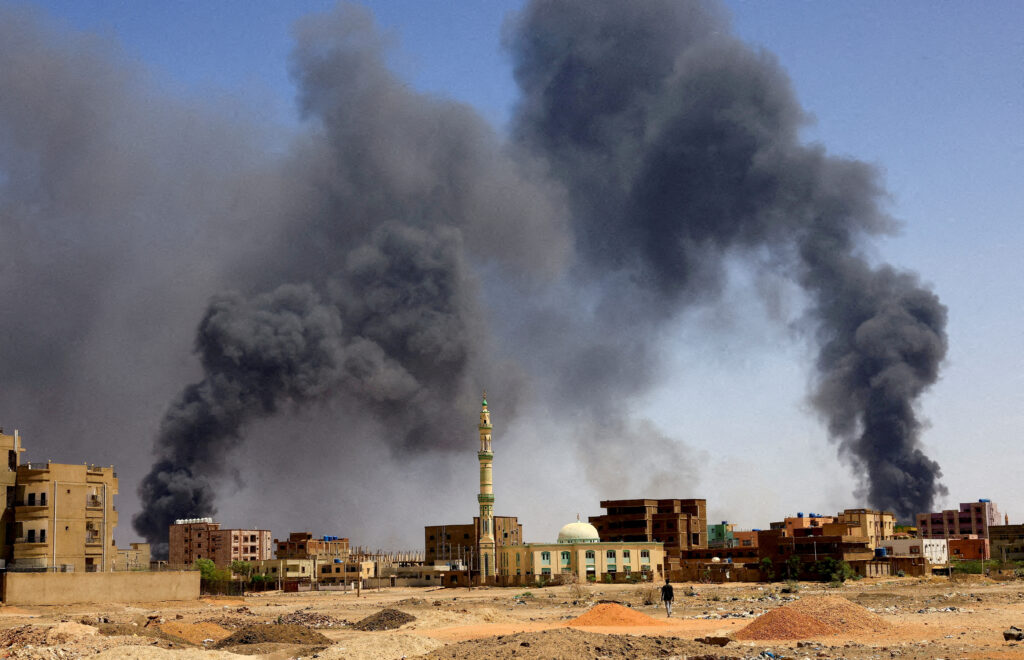
FILE PHOTO: A man walks while smoke rises above buildings after aerial bombardments during clashes between the paramilitary Rapid Support Forces and the army in Khartoum North, Sudan, May 1, 2023. REUTERS/Mohamed Nureldin Abdallah/File Photo
CAIRO—Fighting rocked several cities in western Sudan on Wednesday in an expansion of the country’s almost two-month-old war as a regional governor was killed after publicly blaming the deaths of civilians on the country’s paramilitary force.
The conflict between the army and the paramilitary Rapid Support Forces has caused a humanitarian crisis in Khartoum, as well as major cities in the Kordofan and Darfur regions.
The widening footprint of fighting threatens to prolong the violence and draw in armed groups – particularly those with tribal affiliations – as well as external actors.
West Darfur state governor Khamis Abbakar was killed on Wednesday, an armed group he commanded said, hours after he accused the RSF and allied militias of “genocide.” No details on his death were available. Two government sources said the RSF was responsible.
READ MORE: Eid’l Adha: A celebration of peace and solidarity
“Civilians are being killed randomly and in large numbers,” Abbakar told Al-Hadath TV earlier on Wednesday, calling for international intervention.
The RSF did not immediately respond to a request for comment.
Activists say 1,100 people have been killed since the conflict began in mid-April in the westernmost city of El Geneina, the capital of West Darfur.
While the attacks originally targeted areas of El Geneina where members of the Masalit tribe lived, these attacks have spread to the entire city, the governor said.
“We haven’t seen the army leave its base to defend people,” he added before his death.
The Darfur region of Sudan has seen periods of conflict since the early 2000s, when millions were displaced and 300,000 killed by attacks from Arab militias known as the Janjaweed. The RSF evolved out of those groups, becoming a legalized governmental force in 2017.
In a statement, the RSF called the fighting in El Geneina a tribal conflict, blaming the country’s former regime for fanning the flames. It said it had been making efforts to get aid into the city.
Diplomatic efforts to address Sudan’s conflict led by the United States and Saudi Arabia have faltered, as numerous ceasefires have been violated. On Tuesday, senior U.S. State Department officials said they were considering a new approach for the coming days.
FIGHTING ACROSS DARFUR
The Darfur Bar Association, a local group monitoring the fighting, said on Wednesday that artillery strikes hit civilian homes in Nyala, capital of South Darfur, after RSF soldiers complained of not receiving salaries.
“The assault could start again at any moment, we don’t feel safe,” said resident Salah Alamin, 39.
The city of Zalingei, capital of Central Darfur, was under siege, the association said. The city of El Fashir, capital of North Darfur, has been quieter but has seen a wave of displacement from RSF-controlled Kutum.
Meanwhile in El Obeid, a hub between Khartoum and Darfur in North Kordofan, residents said the army launched air and artillery strikes against RSF positions. The RSF has controlled the roads connecting the city to other towns and has agreed with local tribal leaders to secure the area from armed gangs.
Residents said the RSF attacked one of those towns, Al-Rahad, on Wednesday.
READ MORE: What is the Hajj pilgrimage and what does it mean for Muslims?
In Kadugli, South Kordofan, the army pushed back an RSF attack on one of its bases, as troops loyal to rebel leader Abdelaziz al-Hilu surrounded the city. Sources from al-Hilu’s faction, SPLM-N, said that they sought to protect civilians from armed militias.
Within Khartoum, residents reported clashes and air and artillery strikes in southern and eastern districts of the city and in neighbouring Omdurman on Wednesday.
The U.N. said on Tuesday that some 1.7 million people had been displaced internally and more than 500,000 had left the country.
In army-controlled Port Sudan, meanwhile, middle school students began taking exams, while pilgrims to Mecca began their Hajj journeys, as some attempted to find some normality.
The Sudanese Doctors Union said that at least 958 people have been killed since fighting began on April 15, over the integration of the RSF into the military.
Disclaimer: The comments uploaded on this site do not necessarily represent or reflect the views of management and owner of Cebudailynews. We reserve the right to exclude comments that we deem to be inconsistent with our editorial standards.
